The Four-Chambered Heart coti-3 Read online
The Four-Chambered Heart
( Cities of the Interior - 3 )
Anaïs Nin
The Four-Chambered Heart is an autobiographical novel by French-born writer Anaïs Nin, part of her Cities of the Interior sequence. It is about a woman named Djuna, her love, her thoughts, her emotions, her doubts, her decisions, and her sacrifices.
Anaïs Nin
THE FOUR-CHAMBERED HEART
THE GUITAR DISTILLED ITS MUSIC
Rango played it with the warm copper color of his skin, with the charcoal pupil of his eyes, with the underbrush thickness of his eyebrows, pouring into the honey-colored box the flavors of the open road on which he lived his gypsy life: thyme, rosemary, oregano, marjoram, and sage. Pouring into the resonant box the sensual swing of his hammock hung across the gypsy cart and the dreams born on his mattress of black horsehair.
Idol of the night clubs, where men and women barred doors and windows, lit candles, drank alcohol, and drank from his voice and his guitar the potions and herbs of the open road, the charivaris of freedom, the drugs of leisure and laziness.
At dawn, not content with the life transfusion through catguts, filled with the sap of his voice which had passed into their veins, at dawn the women wanted to lay hands upon his body. But at dawn Rango swung his guitar over his shoulder and walked away.
Will you be here tomorrow, Rango?
Tomorrow he might be playing and singing to his black horse’s philosophically swaying tail, on the road to the south of France.
Toward this ambulant Rango, Djuna leaned to catch all that his music contained, and her ear detected the presence of this unattainable island of joy which she pursued, which she had glimpsed at the party she had never attended but watched from her window as a girl. And like some lost voyager in a desert, she leaned more and more eagerly toward this musical mirage of a pleasure never known to her, the pleasure of freedom.
“Rango, would you play once for my dancing?” she asked softly and fervently, and Rango stopped on his way out to bow to her, a bow of consent which took centuries of stylization and nobility of bearing to create, a bow indicating the largesse of gesture of a man whad never been bound.
“Whenever you wish.”
As they planned for the day and hour, and while she gave him her address, they walked instinctively toward the river.
Their shadows walking before them revealed the contrast between them. His body occupied twice the space of hers. She walked unswerving like an arrow, while he ambled. His hands trembled while lighting her cigarette, and hers were steady.
“I’m not drunk,” he said, laughing, “but I’ve been drunk so often that my hands have remained unsteady for life, I guess.”
“Where is your cart and horse, Rango?”
“I have no cart and horse. Not for a long time. Not since Zora fell ill, years ago.”
“Zora?”
“My wife.”
“Is your wife a gypsy, too?”
“Neither my wife nor I. I was born in Guatemala, at the top of the highest mountain. Are you disappointed? That legend was necessary to keep up, for the night club, to earn a living. It protects me, too. I have a family in Guatemala who would be ashamed of my present life. I ran away from home when I was seventeen. I was brought up on a ranch. Even today my friends say: ‘Rango, where is your horse? You always look as if you had left your horse tied to the gate.’ I lived with the gypsies in the south of France. They taught me to play. They taught me to live as they do. The men don’t work; they play the guitar and sing. The women take care of them by stealing food and concealing it under their wide skirts. Zora never learned that! She got very ill. I had to give up roaming. We’re home now. Do you want to come in?”
Djuna looked at the gray stone house.
She had not yet effaced from her eyes the image of Rango on the open road. The contrast was painful and she took a step backward, suddenly intimidated by a Rango without his horse, without his freedom.
The windows of the house were long and narrow. They seemed barred. She could not bear yet to see how he had been captured, tamed, caged, by what circumstances, by whom.
She shook his big hand, the big warm hand of a captive, and left him so swiftly he was dazed. He stood bewildered and swaying, awkwardly lighting another cigarette, wondering what had made her take flight.
He did not know that she had just lost sight of an island of joy. The image of an island of joy evoked by his guitar had vanished. In walking toward a mirage of freedom, she had entered a black forest, the black forest of his eyes darkening when he said: “Zora is very ill.” The black forest of his wild hair as he bowed his head in contrition: “My family would be ashamed of the life I lead today.” The black forest of his bewilderment as he stood about to enter a house too gray, too shabby, too cramped for his big, powerful body.
Their first kiss was witnessed by the Seine River carrying gondolas of street lamps’ reflections in its spangled folds, carrying haloed street lamps flowering on bushes of black lacquered cobblestones, carrying silver filigree trees opened like fans beyond whose rim the river’s eyes provoked them to hidden coquetries, carrying the humid scarves of fog and the sharp incense of roasted chestnuts.
Everything fallen into the river and carried away except the balcony on which they stood.
Their kiss was accompanied by the street organ and it lasted the whole length of the musical score of Carmen, and when it ended it was too late; they had drunk the potion to its last drop.
The potion drunk by lovers is prepared by no one but themselves.
The potion is the sum of one’s whole existence.
Every word spoken in the past accumulated forms and colors in the self. What flows through the veins besides blood is the distillation of every act committed, the sediment of all the visions, wishes, dreams, and experiences. All the past emotions converge to tint the skin and flavor the lips, to regulate the pulse and produce crystals in the eyes.
The fascination exerted by one human being over another is not what he emits of his personality at the present instant of encounter but a summation of his entire being which gives off this powerful drug capturing the fancy and attachment.
No moment of charm without long roots in the past, no moment of charm is born on bare soil, a careless accident of beauty, but is the sum of great sorrows, growths, and efforts.
But love, the great narcotic, was the hothouse in which all the selves burst into their fullest bloom…
love the great narcotic was the revealer in the alchemist’s bottle rendering visible the most untraceable substances
love the great narcotic was the agent provocateur exposing all the secret selves to daylight
love the great narcotic-lined fingertips with clairvoyance
pumped iridescence into the lungs for transcendental x-rays
printed new geographies in the lining of the eyes
adorned words with sails, ears with velvet mutes
and soon the balcony tipped their shadows into the river, too, so that the kiss might be baptized in the holy waters of continuity.
Djuna walked along the Seine the next morning asking the fishermen and the barge sailors for a boat to rent in which she and Rango might live.
As she stood by the parapet wall, and then leaned over to watch the barges, a policeman watched her.
(Does he think I am going to commit suicide? Do I look like someone who would commit suicide? How blind he is! I never wanted less to die, on the very day I am beginning to live!)
He watched her as she ran down the stairs to talk to the owner of Nanette, a bright red barge. Nanette had little windows trimmed with beaded curtains just like the superintendent’s windows in apartmen
t houses.
(Why bring to a barge the same trimmings as those of a house? They are not made for the river, these people, not for voyages. They like familiarity, they like to continue their life on earth, while Rango and I want to run away from houses, cafes, streets, people. We want to find an island, a solitary cell, where we can dream in peace together. Why should the policeman think I may jump into the river at this moment when I never felt less like dying? Or does he stand there to reproach me for slipping out of my father’s house last night after ten o’clock, with such infinite precautions, leaving the front door ajar so he would not hear me leave, deserting his house with a beating heart because now his hair is white and he no longer understands anyone’s need to love, for he has lost everything, not to love, but to his games of love; and when you love as a game, you lose everything, as he lost his home and wife, and now he clings to me, afraid of loss, afraid of solitude.)
That morning at five-thirty she had awakened, gently untangled her body from Rango’s arms and reached her room at six, and at six-thirty her father had knocked on the door because he was ill and wanted care.
(Ali Baba protects the lovers! Gives them the luck of bandits, and no guilt; for love fills certain people and expands them beyond all laws; there is no time, no place for regrets, hesitations, cowardices. Love runs free and reckless; and all the gentle trickeries perpetrated to protect others from its burns—those who are not the lovers but who might be the victims of this love’s expansion—let them be gentle and gay about these trickeries, gentle and gay like Robin Hood, or other games of children; for Anahita, the moon goddess, will then judge and mete out punishment, Mr. Policeman. So wait for her orders, for I am sure you would not understand if I told you my father is delightfully clear and selfish, tender and lying, formal and incurable. He exhausts all the loves given to him. If I did not leave his house at night to warm myself in Rango’s burning hands I would die at my task, arid and barren, sapless, while my father monologues about his past, and I yawn yawn yawn… It’s like looking at family albums, at stamp collections! Understand me, Mr. Policeman, if you can: if that were all I had, I would indeed be in danger of jumping into the Seine, and you would have to take a chill rescuing me. See, I have money for a taxi, I sing a song of thanksgiving to the taxi which nourishes the dream and carries it unbreakable, fragile but unbreakable everywhere. The taxi is the nearest object to a seven-leagued boot, it perpetuates the reverie, my vice, my luxury. Oh, you can, if you wish, arrest me for reverie, vagabondage of the wildest sort, for it is the cell, the mysterious, the padded, the fecund cell in which everything is born; everything that man ever accomplished is born in this little cell…)
The policeman passed by and did not arrest her, so she confided in him and found him rich with knowledge. He knew of many barges here and there. He knew one where they served fried potatoes and red wine to fishermen, another where hobos could spend the night for five cents, one where a woman in trousers carved big statues, another one turned into a swimming pool for boys, another one called the barge of the red lights, for men, and beyond this one there was a barge that had been used by a troupe of actors to travel all through France, and there she might inquire as it was empty and had been deemed unsafe for long voyages…
It was anchored near the bridge, long and wide, with a strong prow from which hung the heavy anchor chain. It had no windows on the side, but a glass trap door on deck which an old watchman threw open for her. She descended a narrow and steep stairway to find herself in a broad room, with light falling from skylight windows, and then there were a smaller room, a hallway, and more small cabins on each side.
The large center room which had been used for the stage was still full of discarded sets and curtains and costumes. The small cabins which branched off on both sides had once been dressing rooms for the ambulant actors. They were now filled with pots of paint, firewood, tools, old sacks, and newspapers. At the prow of the barge was a vast room papered with glossy tarpaper. The skylight windows showed only the sky, but two openings in the wall, working like drawbridges on a chain, were cut only a few inches above water level and focused on the shore.
The watchman occupied one of the small cabins. He wore a beret and dark blue denim blouse like the French peasants.
He explained: “I was the captain of a pleasure yacht once. The yacht blew up and I lost my leg. But I can fetch water for you, and coal and wood. I can pump the water every day. This barge has to be watched for leaks. It’s pretty old, but the wood is strong.”
The walls of the barge curved like the inside of a whale belly. The old beams were stained with marks of former cargoes: wood, sand, stone, and coal.
As Djuna left, the old watchman picked up a piece of wood which held a pail at each end, hanging on a cord. He balanced it on his shoulders like a Japanese water carrier, and began to jump on his one leg after her, keeping a miraculous balance on the large cobblestones.
The winter night came covering the city, dusting the street lamps with fog and smoke so that their light dissolved into an aureole of sainthood.
When Djuna and Rango met, he was sad that he had found nothing to shelter them. Djuna said: “I have something for you to see; if you like it, it might do for us.”
As they walked along the quays, as they passed the station through a street being repaired, she picked up one of the red lanterns left by the repair men, and carried it, all lit, across the bridge. Halay they met the same policeman who had helped her find the barge. Djuna thought: “He will arrest me for stealing a street lantern.”
But the policeman did not stop her. He smiled, knowing where she was going, and merely appraised Rango’s build as they passed.
The old watchman appeared suddenly at the trap door and shouted: “Hey, there! Who goes there? Oh, it’s you, petite madame. Wait. I’ll open for you.” And he threw the trap door fully open.
They descended the turning stairway and Rango smelled the tar with delight. When he saw the room, the shadows, the beams, he exclaimed: “It’s like The Tales of Hoffmann. It’s a dream. It’s a fairy tale.”
Old grandfather of the river, ex-captain of a pleasure yacht, snorted insolently at this remark and went back to his cabin.
“This is what I wanted,” said Rango.
He bent down to enter the very small room at the tip of the barge which was like a small pointed prison with barred windows. The enormous anchor chain hung before the iron bars. The floor had been worn away, rotted with dampness, and they could see through the holes the layer of water which lies at the bottom of every ship, like the possessive fingers of the sea and the river asserting its ownership of the boat.
Rango said: “If ever you’re unfaithful to me, I will lock you up in this room.”
With the tall shadows all around them, the medieval beams cracking above their heads, the lapping water, the mildew at the bottom, the anchor chain’s rusty plaintiveness, Djuna believed his words.
“Djuna, you’re taking me to the bottom of the sea to live, like a real mermaid.”
“I must be a mermaid, Rango. I have no fear of depths and a great fear of shallow living. But you, poor Rango, you’re from the mountain, water is not your element. You won’t be happy.”
“Men from the mountains always dream of the sea, and above all things I love to travel. Where are we sailing now?”
As he said this, another barge passed up the river close to theirs. The whole barge heaved; the large wooden frame cracked like a giant’s bones.
Rango lay down and said: “We’re navigating.”
“We’re out of the world. All the dangers are outside, out in the world.” All the dangers…dangers to the love, they believed as all lovers believe, came from the outside, from the world, never suspecting the seed of death of love might lie within themselves.
“I want to keep you here, Djuna. I would like it if you never left the barge.”
“I wouldn’t mind staying here.”
(If it were not for Zora, Zora awaiting food, a
waiting medicines, awaiting Rango to light the fire.)
“Rango, when you kiss me the barge rocks.”
The red lantern threw fitful shadows, feverish red lights, over their faces. He named it the aphrodisiac lamp.
He lighted a fire in the stove. He threw his cigarette into the water. He kissed her feet, untied her shoes, he unrolled her stockings.
They heard something fall into the water.
“It’s a flying fish,” said Djuna.
He laughed: “There are no flying fish in the river, except you. When you’re in my arms, I know you’re mine. But your feet are so swift, so swift, they carry you as lightly as wings, I never know where, too fast, too fast away from me.”
He rubbed his face, not as everyone does, with the palm of the hand. He rubbed it with his fists closed as children do, as bears and cats do.
He caressed her with such fervor that the little red lantern fell on the floor, the red glass broke, the oil burst into many small wild flames. She watched it without fear. Fire delighted her, and she had always wanted to live near danger.
After the oil was absorbed by the thick dry wooden floor, the fire died out.
They fell asleep.
The drunken grandfather of the river, ex-captain of a pleasure yacht, had lived alone on the barge for a long time. He had been the sole guardian and owner of it. Rango’s big body, his dark Indian skin, his wild black hair, his low and vehement voice frightened the old man.
When Rango lit the stove at night in their bedroom, the old man in his cabin would begin to curse him for the noise he made.
Also he resented that Rango did not let him wait on Djuna, and he would mutter against him when he was drunk, mutter threats in apache language.
One night Djuna arrived a little before midnight. A windy night with dead leaves blowing in circles. She was always afraid to walk alone down the stairs from the quays. There were no lights. She stumbled on hobos asleep, on whores plying their trade behind the trees. She tried to overcome her fear and would run down the steps along the edge of the river.

 Diary of Anais Nin, Volume 5
Diary of Anais Nin, Volume 5 A Spy in the House of Love
A Spy in the House of Love In Favor of the Sensitive Man and Other Essays (Original Harvest Book; Hb333)
In Favor of the Sensitive Man and Other Essays (Original Harvest Book; Hb333)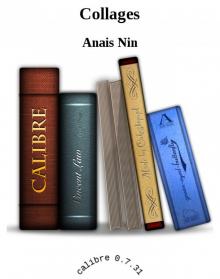 Collages
Collages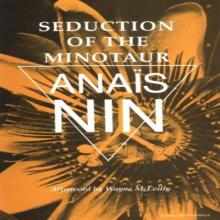 Seduction of the Minotaur
Seduction of the Minotaur Children of the Albatross
Children of the Albatross Delta of Venus
Delta of Venus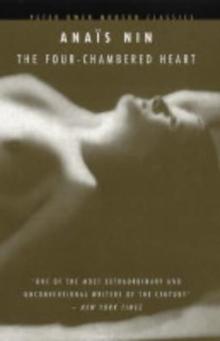 The Four-Chambered Heart coti-3
The Four-Chambered Heart coti-3 Diary of Anais Nin, Volume 2
Diary of Anais Nin, Volume 2 Diary of Anais Nin, Volume 1
Diary of Anais Nin, Volume 1 Diary of Anais Nin, Volume 4
Diary of Anais Nin, Volume 4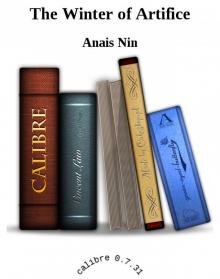 The Winter of Artifice
The Winter of Artifice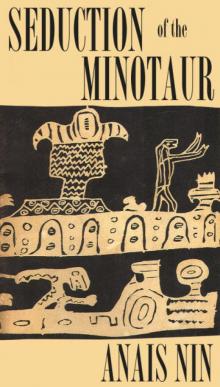 Seduction of the Minotaur coti-5
Seduction of the Minotaur coti-5 Children of the Albatross coti-2
Children of the Albatross coti-2 Henry and June: From A Journal of Love -The Unexpurgated Diary of Anaïs Nin (1931-1932)
Henry and June: From A Journal of Love -The Unexpurgated Diary of Anaïs Nin (1931-1932) Ladders to Fire
Ladders to Fire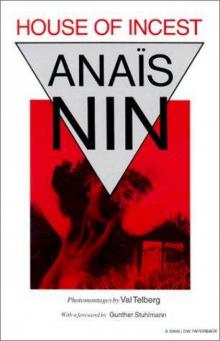 House of Incest
House of Incest